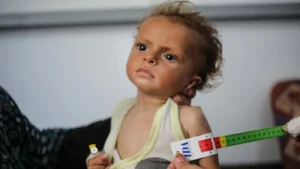The UK must act now to save Gaza’s children

A malnourished Palestinian child is examined at a hospital in the Nuseirat refugee camp, central Gaza, on 30 June 2025
Kim Johnson writes in Middle East Eye on 10 July 2025:
For the past 21 months, Gaza has faced genocide at the hands of the Israeli state. Over this time, I’ve watched with heartbreak, frustration and resolve as a humanitarian crisis has spiralled into a catastrophe.
Gaza’s health system has been all but destroyed. Thousands of children have suffered catastrophic injuries from bombing, burns, shrapnel, starvation or delayed treatment. Thousands have chronic health conditions but are unable to receive vital treatment that would be easily accessible in so many countries.
Their only hope lies beyond the border, yet so few are being allowed to leave.
That’s why, for nearly two years, I’ve been working with charities, clinicians, legal advocates and cross-party colleagues to campaign for the UK to step up – not just in words, but in actions. And finally, in April, we saw a breakthrough.
Two brave young children arrived in London from Gaza – the first children medically evacuated to the UK since the escalation began in October 2023. They came here for urgent treatment. One needed surgery to save her sight. The other had a lifelong bowel condition that local doctors simply could not treat.
Their journey was made possible thanks to the amazing work of NGOs and a network of supporters, including frontline National Health Service staff, lawyers and campaigners. This was a landmark moment. But we must be clear: it cannot stop here. The arrival of these two children should be viewed as the start of a national programme, not the end of a campaign.
Coordinated response
The UK has a commendable track record of supporting children to receive needed medical care during armed conflict. It has proven that it can act and that there is political will. It has proven that we have the capacity, the infrastructure, and crucially, the support of healthcare professionals and the public.
What we haven’t seen yet is a coordinated, scaled-up response.
Last October, Unicef reported that around 2,500 children in Gaza needed complex medical care that could only be delivered outside of the war-torn territory – but just 22 children per month were being medically evacuated because of the Rafah border closure. At that rate, it would take more than seven years to treat the children already identified as needing urgent care.
